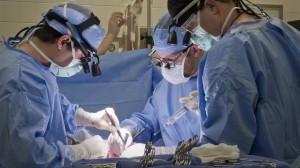
Dr. Mark Earl, left, assistant professor of transplant surgery, conducts UMMC’s first pancreas transplant on Dec. 5, assisted by Dr. Andrew Gaugler, center, chief surgery resident, and Dr. Christopher Anderson, associate professor of transplant surgery and division chief of transplant and hepatobiliary surgery.
JACKSON, Miss. – Building on the University of Mississippi Medical Center’s record of firsts, surgeons transplanted a pancreas and kidney into a 49-year-old man on Thursday night, marking the first such event for the state and final piece of UMMC’s abdominal transplant line.
“Our goal has been to build a complete and high-functioning abdominal transplant program,” said Dr. Christopher Anderson, UMMC associate professor of transplant surgery and division chief of transplant and hepatobiliary surgery.
“The pancreas transplant program represents that last piece of the abdominal program and is the culmination of a lot of hard work from our transplant team and the entire institution. University Transplant can now serve the state’s kidney, liver and pancreas needs while keeping patients close to home.”
The patient has suffered from type 1 diabetes since childhood and subsequently developed kidney failure. He is in good condition today and is expected to return home this week or early next.
Dr. Mark Earl, assistant professor of transplant surgery, performed the operation, assisted by Anderson and Dr. Andrew Gaugler, a chief surgery resident.
“This procedure will improve quality of life and provide a significant survival benefit over dialysis and insulin therapy,” Earl said.
“While we celebrate this success and what it means for Mississippians in the future, we also sincerely thank the donor family. They lost someone irreplaceably special yet made an incredibly life-affirming decision to donate.”
During a 24-hour span that included the milestone pancreas operation, UMMC teams transplanted five organs into four Mississippians. Other patients received a heart, kidney and liver.
“It’s remarkable how far organ transplant – at this very institution – has come, from Dr. James Hardy transplanting the first human lung just over 50 years ago to these recent outstanding achievements,” said Dr. Marc Mitchell, professor and chair of the Department of Surgery.
“With operations like these, we’re giving UMMC trainees first-rate experiences. They’ll use these skills to serve the health-care needs of our state and the world.”
In addition to Gaugler, two general surgery residents, a third-year medical student, a critical-care fellow and a student nurse anesthetist observed or participated in the operation.
The transplant program began administrative and logistical preparations about a year ago for first pancreas transplant. In late September, University Transplant received pancreas approval from the United Network for Organ Sharing, the nation’s non-profit oversight organization for transplantation.
“The patient was listed in October and we’ve been waiting on suitable organs to become available. Organs for transplantation are an incredibly scarce, precious resource and a pancreas is one of the rarest,” Earl said.
Transplants require broad coordination between medical and surgical faculty members, the Mississippi Organ Recovery Agency, operating-room nurses, techs, administration, laboratory staff, blood bank employees, intensive care unit members and transplant-floor nurses.
The continuum of care surrounding each transplant, including the four last week, speaks to the caliber of employees UMMC, said Dr. William Little, professor and chair of the Department of Medicine.
“When you look at how many people play a role in operations like these, the care beforehand, preparation, execution and long-term follow-up, it really indicates the high quality of care at our institution,” Little said.
“You also have to recognize, many UMMC faculty members, fellows and students research the very diseases that Mississippians suffer most, including heart disease, diabetes, liver, kidney, obesity and hypertension. In that sense, we’re working to prevent disease progression that leads to organ failure.”
The pancreas, part of both the digestion and endocrine systems, is located deep in the abdomen, behind the stomach and is connected to the small intestine.
It produces insulin and several other hormones, and pancreatic enzymes, which it secretes into a person’s intestine. The pancreatic enzymes help break down carbohydrates, protein and fats during digestion. The hormones help the body regulate blood sugar levels.
Dr. Kenneth Kokko, associate professor of nephrology and renal transplant program medical director, said the pancreas will prolong the life of the patient’s new kidney.
“It could also have the added benefit of preventing severe hypoglycemic episodes which further complicate the care of these patients,” Kokko said.
Dr. Steven Wagner, assistant professor of nephrology, said years of diabetes weakened the patient’s kidneys.
“The reason he has diabetes is that his pancreas is not making insulin. Replacing the pancreas will effectively treat his diabetes, and he shouldn’t need to inject insulin anymore,” Wagner said. “That’s pretty life changing, to not have to inject. Diabetes ends up controlling your life.”
Thanks to the new kidney he also shouldn’t need to dialyze any more, an all-night, every-night process he underwent at home for the past two years.
Wagner said the patient’s overall healthy lifestyle made him a good candidate.
“He was doing a really good job with his diabetes. His efforts to maintain his fitness probably kept him alive,” Wagner said.
This year University Transplant has completed 98 kidney, 19 liver and six heart transplants in addition to the first pancreas.
Organ donation remains a cornerstone of University Transplant and is lifesaving to hundreds of Mississippians and thousands of Americans each year. Anderson encouraged people to join the organ donor registry. More information can be found through the Mississippi Organ Recovery Agency at www.msora.org.